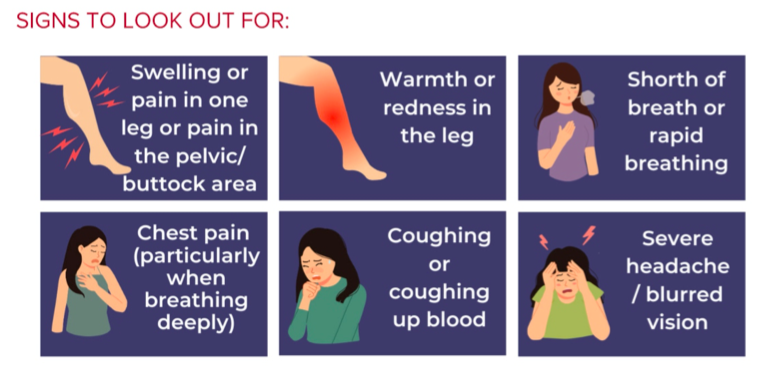On top of dealing with hyperemesis symptoms, HG can also increase the risk of other conditions in pregnancy. Below is some information on these, how to recognise them, and how to get treatment. For most of these, the best way to reduce your risk is to get the correct treatment for HG.
Thombosis/VTE
In pregnancy and the six weeks afterwards, the risk of blood clots is increased for everyone. It is preventable and treatable, but is the most common cause of death in pregnancy and postnatally in the UK and Ireland (MBRRACE report 2024 and 2025), so it is something to be aware of.
For HG patients, risk of blood clots can be increased even more because of dehydration and immobility - i.e. not being able to leave bed or the couch for most of the day for 3+ days in a row.
What can you do?
- Take your medications as prescribed, and do your best to stay hydrated - some tips here.
- Try to get out of bed and move a few times a day, even if just for a few minutes. Tell your doctor if you are not able to leave bed/home due to your symptoms.
- Ask your medical team about assessing your risk of blood clots and if so, if they have taken hyperemesis into account. This is particularly important if you have had blood clots before, if you have a family history of them, or if you have had Covid recently.
- Your risk should be re-assessed throughout your pregnancy as your HG symptoms change.
- You may need to do additional things to reduce your risk, such as wearing compression stockings or taking anti-clotting medications.
- Pay attention to any signs of thrombosis and get medical help urgently if you notice any of the following:

Thanks to Thrombosis Ireland for this graphic. More information and translations is available in this PDF and on their website thrombosis.ie
UTI/Urinary Tract Infection
These are common in pregnancy, and can show up in routine urine tests even if you don't have any symptoms. You can read about the symptoms from the HSE website here. Having HG can make things more difficult:
- Being dehydrated can make a UTI more likely to happen.
- Drinking lots of fluids - often advised to help UTI symptoms - can be difficult with HG.
- If you are having trouble keeping tablets down, it may be more difficult to take antibiotics to treat a UTI. If you are prescribed antibiotics, tell the doctor/pharmacist about your HG and ask what to do if you vomit an antibiotic dose.
- UTIs can sometimes cause nausea and vomiting. Unfortunately, we have heard from some HG patients that their doctor blamed all their symptoms on a UTI which delayed them getting treatment they needed for their HG. Read more about advocating for HG treatment here.
If untreated, in rare cases a UTI can cause sepsis which is a medical emergency.
Pre-eclampsia, Eclampsia, and HELLP syndrome
What are these conditions ?
These are pregnancy complications which mean your blood pressure is higher than normal and you have protein in your urine. Pre-eclampsia is the most common. It usually appears in later pregnancy (after 30w) but sometimes earlier (from 20w). Usually it is treated with increased monitoring, medications to lower blood pressure, and sometimes planned delivery of the baby (through induction of labour, or c-section). If untreated, pre-eclampsia can lead to growth restriction for the baby and eventually seizures (eclampsia), stroke, and death for the mother. Rarely, pre-eclampsia can also occur in the six weeks after pregnancy.
We don’t yet know exactly why HG can increase your risk of pre-eclampsia, but research strongly suggests there is a link:
…[on average] about 80 out of every 1,000 pregnant women would develop preeclampsia or a related condition. However, among 1,000 pregnant women with HG, you would see about 93 women who went on to develop preeclampsia. (The good news is that over 900 pregnant women with HG would not go on to have preeclampsia!)
What can I do?
- If you have other risk factors for pre-eclampsia (see here for a list), ask your doctor in early pregnancy if you should be taking low-dose aspirin, which can help reduce your risk.
- Go to all your antenatal appointments, and make sure your urine and blood pressure is checked.
- If you notice any of the following symptoms, contact your GP or hospital and ask them to check you for pre-eclampsia:
- Swelling in your hands, feet, ankles, neck, or face
- Headache, especially one that is unusual for you or doesn’t improve with over-the-counter medications like paracetamol
- Vision problems, such as blurring, spots or flashing lights
- Pain under the ribs, particularly on the right hand side
- Nausea and vomiting: yes, this is tricky to identify for HG patients! But pay attention if your nausea and/or vomiting comes back in later pregnancy when it eased earlier, or worsens from your normal level.
SSRIs, ondansetron, and serotonin syndrome
Sometimes, HG patients are told that they cannot take ondansetron while also taking an SSRI, because of the risk of a condition called serotonin syndrome. Is this true, and what do you need to know? Read more about this here.
NB: Stopping or changing SSRIs during pregnancy can lead to a relapse of depression or anxiety, which carries its own risks for both the mother and baby. HG commonly affects mental health. Do not stop your medications without consulting with your doctor.
